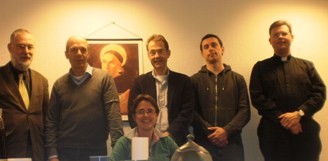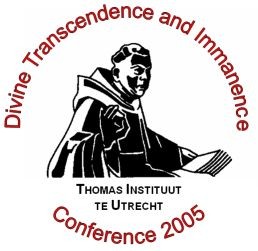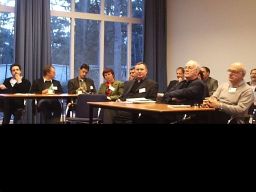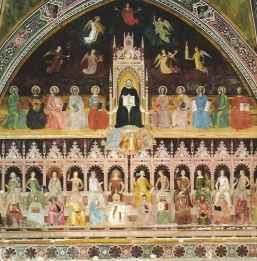Home > About us > Conferences
Conferences
5the international conference of The Thomas Instituut te Utrecht:
‘The virtuous life. Thomas Aquinas on the theological nature of moral virtues’,
16 - 19 December 2015, Utrecht (The Netherlands).
The theme of this year’s conference accorded with that of 2013, about Thomas’s theology of faith, hope and love, the God-given virtues. According to Thomas, God also gives, together with these three theological virtues, moral virtues to the faithful. Especially the ‘cardinal’ virtues or ‘hinge’ virtues of prudence, justice, temperance, and fortitude. These four determine the well-functioning of the four human powers that play a part in the making of moral choices, personal as well as political: respectively the intellect, the will, the desiring emotions, and the emotion that overcome resistance. People can obtain these virtues by themselves, but according to Thomas are they also being given by God’s mercy. The conference was about Thomas’s theology of the given moral virtues. A peculiar subject at first sight. But in the last few years, mainly among American Thomists, it has become a major topic in the discussion about the church-state relations, between faith and politics. Against the background of the general renaissance of virtue ethics, the question occurs how the Christian (given) virtues relate to the ‘secular’ (self-acquired) virtues. Some judge these secular virtues negatively, e.g. Augustine, who called the classical Roman ideals like the virtue of justice ‘beautiful vices’. They tend to view Christianity as the last barrier against a secular ‘culture of death’. On the other hand, others notice a lot more similarity between Christian and non-Christian morality. These are not obscure questions. The conference’s theme proved to be much more relevant and exciting than it might have seen at first sight. Besides the cultural and political questions that arise, this theme also has consequences for the personal spirituality of the faithful: ‘how can I cultivate my life of faith in daily life?’
The main speakers were Angela Knobel McCay (Washington), David Decosimo (Boston), Andrew Pinsent (Oxford) en Bill Mattison (Washington). Besides these speakers, there were shorter plenary lectures from Rudi te Velde (Tilburg), Randall Smith (Houston), Tom Osborne (Houston), Michael Sherwin (Fribourg), Lambert Hendriks (Tilburg/Rolduc), John O’Callaghan (Notre Dame), Frederick Bauerschmidt (Baltimore) and Harm Goris (Tilburg). There were broadly twenty presentations of papers in parallel sessions. Because of the precise delineation of the subject and because it was related to a specific contemporary discussion, the same above-mentioned questions and the same texts of Thomas were used by the different speakers, but every time from a different viewpoint and/or evaluation. A lot of interaction and discussion in a lively manner arose.
A total of 60 junior and senior scholars participated in the conference, from eleven different nations, from Canada to the Philippines. The main lectures will be published by Peeters in the publication series of the Thomas Instituut in 2016.
- - - - - - - - - - - - - - - - - - - - - - - - - - -
Faith, Hope and Love
Thomas Aquinas on living by the infused virtues
11 - 12 - 13 - 14 December 2013
Utrecht (Netherlands)
During the last two decades virtue ethics has become the focal point of renewed ethical and theological interest. To lead a good life, it proves useful to watch those who have mastered the art of living. The conviction that living is an art is at the heart of virtue ethics. Living a good life requires exercise, and is a question of acquiring a virtuous character rather than of complying with external ethical and legal rules.
This renaissance partly builds on Thomas Aquinas. He in turn recovered Aristotelian, Ciceronian and Augustinian thought on virtue ethics. The interpretation and development of virtues and vices form the core of his authorship, as the secunda pars of his Summa Theologiae readily displays. And yet, the most important virtues for him are not the moral ones, such as Justice, Temperance, Prudence and Fortitude, but those virtues that are both infused by and aimed at God: Faith, Hope and Love. These are virtues that the philosophers of antiquity were not aware of. To account for them, Aquinas had to adapt the classical understanding of virtues. For Aquinas, the moral virtues come to full fruition only when they are embedded in a life before God, a life lived exercising the God given theological virtues. By ignoring Faith, Hope and Love, the present discussion of virtue ethics not only ignores those virtues that were for Aquinas of utmost importance, but also fails to arrive at a complete understanding of his view of the moral virtues.
How does Aquinas elaborate his thoughts on the theological virtues?
To what extent can developments in his views on the theological virtues be traced?
How do his views on the theological virtues compare to those on the moral ones?
What do we learn here about the relationship between the philosophy of ethics and (moral) theology, between nature and grace, and between theology and spirituality?
And also: why is it useful to think about Faith, Hope and Love as virtues, even though they are gifts of God, and man can easily lose them on account of sinful behavior?
Can Christ serve as an example of virtuous life?
Did he possess theological virtues?
Why does Aquinas think that Justice is the prime moral virtue, and Love the greatest among the theological ones?
And what does all this entail for modern theological anthropology?
In a four-day conference, scholars from different disciplines and different countries devoted their attention to these questions. The proceedings of this conference have been published in the sixteenth volume of the Publications Series of the Thomas Instituut, with Peeters Publishers in Louvain, under the same title as the conference itself.
The conference committee 2013:

- - - - - - - - - - - - - - - - - - - - - - - - - - -
Conferences and Days of Study 1995-2013
'OUR LORD' - AFTERNOON OF STUDY
12 April 2013
On 12 April 2013 the Thomas Instituut te Utrecht organised an afternoon of studies about the last publication by prof. Ferdinand de Grijs (1931-2011): Onderzoekingen in het katholieke geloof over Jezus Christus - 'Searchings within the catholic faith about Jesus Christ'. It was a succesfull event attended by sixty people.
'THOMAS AQUINAS AS PREACHER' - MORNING OF STUDY
27 Januray 2012
On 27 January - on the eve of the feastday of Thomas Aquinas - the Thomas Instituut te Utrecht organised a morning of studies. Mark-Robin Hoogland c.p., Rudi te Velde and Henk Schoot talked about Thomas’s academic sermons.
SYMPOSIUM AND FAREWELL LECTURE PROF.DR. HERWI RIKHOF
28 January 2011 Tilburg University
On 28 January 2011, feastday of Thomas Aquinas, prof.dr. Herwi Rikhof held his farewell lecture as professor for systematic theology, history of dogmatics and theology at the Tilburg School of Theology (Tilburg University). To mark this occasion and to thank him a symposium was held.
CONFERENCE 2005
From 15 to 17 December 2005 the Thomas Instituut te Utrecht held its third international conference at the conference centre ISVW at Leusden (NL), entitled 'Divine Transcendence and Immanence in the Thought of Thomas Aquinas'.
CONFERENCE 2000
From Thursday December 14 until Saturday December 16, 2000 some fifty scholars from all over the world gathered for the second conference of the Thomas Instituut te Utrecht in Leusden, in the neighbourhood of Utrecht. People came from the United States, Russia, Poland, the United Kingdom, Canada, Italy, Germany, Belgium and the Netherlands to discuss 'Aquinas as Authority? Seven Centuries of Problems and Perspectives'.

CONFERENCE 1995
On 13, 14 and 15th of December 1995 the Thomas Instituut te Utrecht held a congress on 'Guilt and Forgiveness in Aquinas'. About 40 participants gathered in the conferencecenter Woudschoten near Zeist to occupy themselves with this subject.
‘The virtuous life. Thomas Aquinas on the theological nature of moral virtues’,
16 - 19 December 2015, Utrecht (The Netherlands).
The theme of this year’s conference accorded with that of 2013, about Thomas’s theology of faith, hope and love, the God-given virtues. According to Thomas, God also gives, together with these three theological virtues, moral virtues to the faithful. Especially the ‘cardinal’ virtues or ‘hinge’ virtues of prudence, justice, temperance, and fortitude. These four determine the well-functioning of the four human powers that play a part in the making of moral choices, personal as well as political: respectively the intellect, the will, the desiring emotions, and the emotion that overcome resistance. People can obtain these virtues by themselves, but according to Thomas are they also being given by God’s mercy. The conference was about Thomas’s theology of the given moral virtues. A peculiar subject at first sight. But in the last few years, mainly among American Thomists, it has become a major topic in the discussion about the church-state relations, between faith and politics. Against the background of the general renaissance of virtue ethics, the question occurs how the Christian (given) virtues relate to the ‘secular’ (self-acquired) virtues. Some judge these secular virtues negatively, e.g. Augustine, who called the classical Roman ideals like the virtue of justice ‘beautiful vices’. They tend to view Christianity as the last barrier against a secular ‘culture of death’. On the other hand, others notice a lot more similarity between Christian and non-Christian morality. These are not obscure questions. The conference’s theme proved to be much more relevant and exciting than it might have seen at first sight. Besides the cultural and political questions that arise, this theme also has consequences for the personal spirituality of the faithful: ‘how can I cultivate my life of faith in daily life?’
The main speakers were Angela Knobel McCay (Washington), David Decosimo (Boston), Andrew Pinsent (Oxford) en Bill Mattison (Washington). Besides these speakers, there were shorter plenary lectures from Rudi te Velde (Tilburg), Randall Smith (Houston), Tom Osborne (Houston), Michael Sherwin (Fribourg), Lambert Hendriks (Tilburg/Rolduc), John O’Callaghan (Notre Dame), Frederick Bauerschmidt (Baltimore) and Harm Goris (Tilburg). There were broadly twenty presentations of papers in parallel sessions. Because of the precise delineation of the subject and because it was related to a specific contemporary discussion, the same above-mentioned questions and the same texts of Thomas were used by the different speakers, but every time from a different viewpoint and/or evaluation. A lot of interaction and discussion in a lively manner arose.
A total of 60 junior and senior scholars participated in the conference, from eleven different nations, from Canada to the Philippines. The main lectures will be published by Peeters in the publication series of the Thomas Instituut in 2016.
- - - - - - - - - - - - - - - - - - - - - - - - - - -
Faith, Hope and Love
Thomas Aquinas on living by the infused virtues
11 - 12 - 13 - 14 December 2013
Utrecht (Netherlands)
During the last two decades virtue ethics has become the focal point of renewed ethical and theological interest. To lead a good life, it proves useful to watch those who have mastered the art of living. The conviction that living is an art is at the heart of virtue ethics. Living a good life requires exercise, and is a question of acquiring a virtuous character rather than of complying with external ethical and legal rules.
This renaissance partly builds on Thomas Aquinas. He in turn recovered Aristotelian, Ciceronian and Augustinian thought on virtue ethics. The interpretation and development of virtues and vices form the core of his authorship, as the secunda pars of his Summa Theologiae readily displays. And yet, the most important virtues for him are not the moral ones, such as Justice, Temperance, Prudence and Fortitude, but those virtues that are both infused by and aimed at God: Faith, Hope and Love. These are virtues that the philosophers of antiquity were not aware of. To account for them, Aquinas had to adapt the classical understanding of virtues. For Aquinas, the moral virtues come to full fruition only when they are embedded in a life before God, a life lived exercising the God given theological virtues. By ignoring Faith, Hope and Love, the present discussion of virtue ethics not only ignores those virtues that were for Aquinas of utmost importance, but also fails to arrive at a complete understanding of his view of the moral virtues.
How does Aquinas elaborate his thoughts on the theological virtues?
To what extent can developments in his views on the theological virtues be traced?
How do his views on the theological virtues compare to those on the moral ones?
What do we learn here about the relationship between the philosophy of ethics and (moral) theology, between nature and grace, and between theology and spirituality?
And also: why is it useful to think about Faith, Hope and Love as virtues, even though they are gifts of God, and man can easily lose them on account of sinful behavior?
Can Christ serve as an example of virtuous life?
Did he possess theological virtues?
Why does Aquinas think that Justice is the prime moral virtue, and Love the greatest among the theological ones?
And what does all this entail for modern theological anthropology?
In a four-day conference, scholars from different disciplines and different countries devoted their attention to these questions. The proceedings of this conference have been published in the sixteenth volume of the Publications Series of the Thomas Instituut, with Peeters Publishers in Louvain, under the same title as the conference itself.
The conference committee 2013:

- - - - - - - - - - - - - - - - - - - - - - - - - - -
Conferences and Days of Study 1995-2013
'OUR LORD' - AFTERNOON OF STUDY
12 April 2013
On 12 April 2013 the Thomas Instituut te Utrecht organised an afternoon of studies about the last publication by prof. Ferdinand de Grijs (1931-2011): Onderzoekingen in het katholieke geloof over Jezus Christus - 'Searchings within the catholic faith about Jesus Christ'. It was a succesfull event attended by sixty people.
'THOMAS AQUINAS AS PREACHER' - MORNING OF STUDY
27 Januray 2012
On 27 January - on the eve of the feastday of Thomas Aquinas - the Thomas Instituut te Utrecht organised a morning of studies. Mark-Robin Hoogland c.p., Rudi te Velde and Henk Schoot talked about Thomas’s academic sermons.
SYMPOSIUM AND FAREWELL LECTURE PROF.DR. HERWI RIKHOF
28 January 2011 Tilburg University
On 28 January 2011, feastday of Thomas Aquinas, prof.dr. Herwi Rikhof held his farewell lecture as professor for systematic theology, history of dogmatics and theology at the Tilburg School of Theology (Tilburg University). To mark this occasion and to thank him a symposium was held.
CONFERENCE 2005

From 15 to 17 December 2005 the Thomas Instituut te Utrecht held its third international conference at the conference centre ISVW at Leusden (NL), entitled 'Divine Transcendence and Immanence in the Thought of Thomas Aquinas'.
CONFERENCE 2000
From Thursday December 14 until Saturday December 16, 2000 some fifty scholars from all over the world gathered for the second conference of the Thomas Instituut te Utrecht in Leusden, in the neighbourhood of Utrecht. People came from the United States, Russia, Poland, the United Kingdom, Canada, Italy, Germany, Belgium and the Netherlands to discuss 'Aquinas as Authority? Seven Centuries of Problems and Perspectives'.

CONFERENCE 1995
On 13, 14 and 15th of December 1995 the Thomas Instituut te Utrecht held a congress on 'Guilt and Forgiveness in Aquinas'. About 40 participants gathered in the conferencecenter Woudschoten near Zeist to occupy themselves with this subject.
